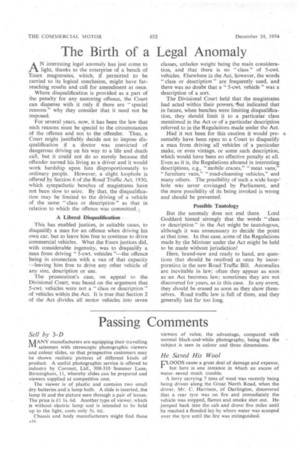The Birth of a Legal Anomaly
Page 18

If you've noticed an error in this article please click here to report it so we can fix it.
A N interesting legal anomaly has just come to light, thanks to the enterprise of a bench of 'Essex magistrates, which, if permitted to be carried to its logical conclusion, might have farreaching results and call for amendment at once. Where disqualification is provided as a part of the penalty for any motoring offence, the Court can dispense with it only if there are "special reasons" why they consider that it need not be imposed.
For several years, now, it has been the law that such reasons must be special to the circumstances of the offence and not to the offender. Thus, a Court might justifiably decide not to impose disqualification if a doctor was convicted of dangerous driving on his way to a life and death call, but it could not do so merely because th6 offender earned his living as a driver and it would work hardship upon him disproportionately to ordinary people. However, a slight loophole is offered by Section 6 of the Road Traffic Act, 1930, which sympathetic benches of magistrates have not been slow to seize. By that, the disqualification may be limited to the driving of a vehicle of the same "class or description" as that in relation to which the offence was committed.
A Liberal Disqualification This has enabled justices, in suitable cases, to disqualify a man for an offence when driving his own car, but to leave him free to continue to drive commercial vehicles. What the Essex justices did, with considerable ingenuity, was to disqualify a man from driving "5-cwt. vehicles "—the offence being in connection with a van of that capacity --leaving him free to drive any other vehicle of any size, description or use.
The prosecution's case, on appeal to the Divisional Court, was based on the argument that 5-cwt. vehicles were not a "class or description" of vehicles within the Act_ It is true that Section 2 of the Act divides all motor vehicles into seven classes, unladen weight being the main consideration, and that there is no " class " of 5-cwt. vehicles. Elsewhere in the Act, however, the words "class or description" are frequently used, and there was no doubt that a "5-cwt. vehicle" was a description of a sort.
The Divisional Court held that the magistrates had acted within their powers. Ian indicated that in future, when benches were limiting disqualification, they should limit it to a particular class mentioned in the Act or of a particular description referred to in the Regulations made under the Act.
Had it not been for this caution it would pre• sumably have been open to a Court to disqualify a man from driving all vehicles of • a particular make, or even vintage, or some such description, which would have been no effective penalty at all. Even as it is, the Regulations abound in interesting descriptions, e.g., "mobile cranes," meat vans," "furniture vans," "road-cleansing vehicles," and many others. The possibility of such a wide loop-' hole was never envisaged by Parliament, and the mere possibility of its being invoked is wrong and should be prevented.
Possible Tautology But the anomaly does not end there. Lord Goddard hinted strongly that the words "class or description" in the Act might be tautologous, although it was unnecessary to decide the point at that time. In that case, some of the Regulations made by the Minister under the Act might be held to be made withou't jurisdiction?
Here, brand-new and ready to hand, are questions that should be resolved at once by incorporation in the new Road Traffic Bill. Anomalies are inevitable in law; often they appear as soon• as -an Act becomes law; sometimes they are not discovered for years, as in this case. In any event, they should be erased as soon as they show themselves. Road traffic law is full of them, and they generally last far too long.












































































